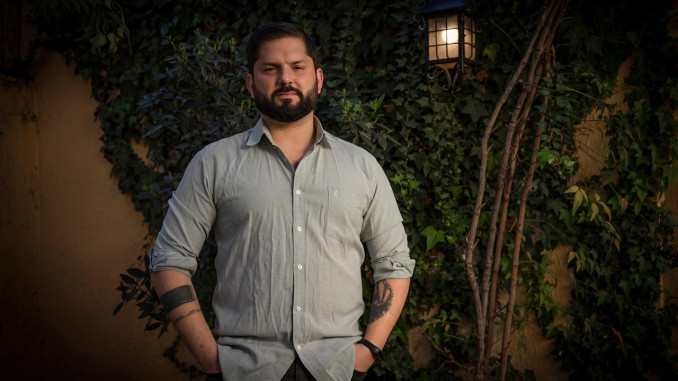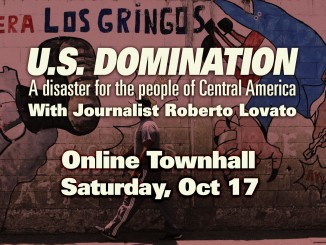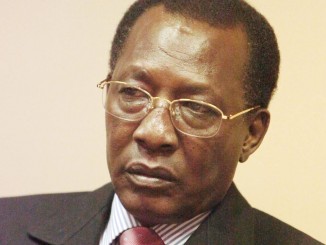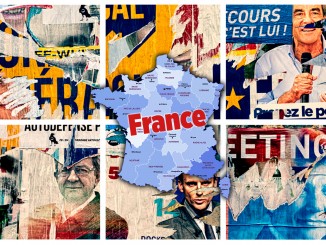
January 6, 2022, Translated from French from Convergences Révolutionnaires, the website of the Etincelle fraction of the NPA
The victory of Gabriel Boric over José Antonio Kast in the second round of Chile’s presidential election on December 19 was met with enthusiasm by some on the left and relief by many in the population. Demonstrations by tens of thousands of people took place when the results were announced. Kast, a candidate of the hard right, didn’t hide his nostalgia for the regime of the ex-dictator, Pinochet. Gabriel Boric, a former student leader, was the candidate of the Apruebo Dignidad coalition, which included the various left-wing groups of the Frente Amplio (Broad Front) and the Communist Party, supported in the second round by various Christian Democratic and Socialist Party figures. While some media outlets have presented Boric as a spokesperson for the “radical left,” it is more accurate to describe him as center-left. All the more so because in order to obtain support from these figures, he had to give them guarantees.
Thirty years of Pinochet’s economic policies… without Pinochet
It took the great popular revolt of autumn 2019 that almost toppled President Piñera to arrive at this point. The increase in the price of a subway ticket in the capital, Santiago, set the fire. In response to this increase, thousands of young people, mostly students, organized mass free rides that triggered the first clashes with the police. Of course, the 30 peso increase was only a sign of a more general situation. Chile, despite its relative economic success, is one of the most unequal countries in the world. The richest 1 percent own almost one-third of the wealth, and the richest 10 percent own half. There is no real social security, and the gap between the Universal Health Coverage that is supposed to cover 80% of the population, and the reality of what it does cover is enormous. Private insurance companies hold the health market and hundreds of thousands of people have no health coverage. State investment in health is low (4.5% of GDP) and 33% of health care is paid for by individuals (Source: Revista Panamericana Salud Publica, 44, 2020). Three quarters of schools and universities are private and fee-paying, so the chances of a poor student completing his or her education are very low.
This ultra-liberal policy is in line with that which was adopted by the Pinochet regime. After the dictator’s relative ouster in 1991, Chile was ruled by the “Concertación,” an alliance of the SP and the Christian Democracy, supported more or less critically by the CP, alternating with right-wing presidencies, such as that of Sebastián Piñera. While political and trade union freedoms and freedom of the press were restored[1], virtually nothing changed in terms of social policy. The rich continued to get richer and the poor continued to get poorer. These are the factors that led to the explosion of 2019.
Fierce repression
The reaction of the Chilean state to the revolt was in line with the traditions of the Pinochet regime. The repression resulted in at least 35 deaths, 2,300 seriously injured (1,400 of them by firearms), hundreds mutilated, and rapes in the barracks and police stations. During the days of November 2019, 12,000 wounded were admitted to emergency rooms. Tens of thousands of arrests were made, reminiscent of the raids of the dictatorship, and several thousand people were imprisoned. But this repression was powerless to stem the anger, and the movement grew, culminating in strikes that paralyzed the ports and blocked exports, and a giant demonstration of 800,000 to one million people in the streets of Santiago, accompanied by demonstrations in all major cities of the country.
Faced with a situation that was getting out of hand, Piñera, after making many firm statements, reached out to the opposition parties and even apologized. This operation was to lead to the signing, on November 15, of a “peace agreement” with fourteen opposition parties to set up a referendum for a new constitution that would put an end to the Pinochet constitution that remained in force. The agreement was signed by Boric himself. Faced with a mobilization that could lead to the overthrow of Piñera, the policy of the left-wing parties, in particular the CP and Boric’s Autonomous Left, was to provide the rebels with an objective that would divert them from street demonstrations and strikes and bring them back to an institutional terrain. Social demands such as higher wages and a higher budget had emerged during the strikes. The Constituent Assembly was thus the way to sideline the movement, driving into institutional terrain. After a referendum that approved the election of an assembly to draft a new constitution, with 80 percent in favor, this 155-member assembly was elected in July 2020. The majority of the members are from the left, including figures from various minorities such as the Mapuche people, an indigenous people that is discriminated against and in constant revolt to claim their rights from the Chilean state. This situation has naturally caused concern among the Chilean bourgeoisie and has led to strong polarization. The hard right rallied around Kast, who had previously been a minority, almost marginal candidate. This revolt frightened the bourgeoisie. So much so that fascist groups recruited from the Golden Youth and the lumpen proletariat resurfaced and undertook various commando operations and lent a hand to the national guard in the repression. It should not be forgotten that Pinochet had always enjoyed a fairly broad social base among the bourgeoisie and part of the petty bourgeoisie, who saw him as a savior, or a sort of “Chilean De Gaulle.” The riots orchestrated by the far right in Iquique at the end of 2021 against migrants, especially Venezuelans, illustrate their potential for mobilization.
What policies will Boric pursue?
The new president has little room for maneuvering. On the one hand, he was elected with an 11-point lead over his competitor, with 55.9 percent of the vote. Although the second round brought in a million voters who had abstained in the first round, the abstention rate was still very high, with 47.3% of Chilean voters not turning out despite the stakes. Boric’s supporters point out that this is one of the highest turnouts since the 1990s. But this nevertheless shows a rejection of the political class or disinterest within a whole part of the working classes, disgusted by politicians who have ignored their fate for thirty years. However, far from trying to attract them to him with a bold social project, Boric sought above all to win back moderate voters between the two rounds. A radical social program could only have frightened them off.
Boric’s few social promises include the creation of a social security system, which would represent significant social progress. But he doesn’t have a majority in the Senate, which must endorse his proposals.
Boric’s first statements give clear indications of his intentions. Patience will be required. The Chilean press has stressed that he will have to moderate the demands of his supporters, and he was careful not to contradict them. In an interview with Radio Bio Bio on Wednesday, January 5, the renowned left-wing economist Ricardo Ffrench-Davis, a member of the future president’s economic commission, said it even more clearly. “It would be a stupidity to give up the private insurance system. If you love your country more than you hate it [AFP, this insurance system] there is no choice!” For his part, former center-left president Ricardo Lagos gave Boric high praise. [2]
Another key point is the protesters who were imprisoned during the 2019 revolt. Boric was careful not to announce that he would release them, even with a presidential pardon. When asked about this by journalists, he replied that their cases would be “examined on a case-by-case basis”! [3] For her part, Camila Vallejo, leader of the CP and former student leader, was indignant that the left could be suspected of wanting to free “thugs who had looted small businesses”. The looting of supermarkets had indeed taken place during the revolt and these acts had been used to justify the violence of the repression. Apart from the fact that looting stores has a special meaning in a country where not everyone has enough to eat and where many lack essential products, it is clear that this distinction between good and bad demonstrators is intended to win the favor of the bourgeoisie and the petty bourgeoisie. In an interview with La Tercera [4], a widely read right-wing daily, Vallejo was cautious and evasive, refraining from answering when asked if Boric had moved to the center left. The Chilean CP wants its place in the new government and this is not the first time it has participated in a government since the end of the Pinochet reign. It had already participated in a center-left coalition led by socialist President Bachelet between 2013 and 2017. [5] Through its influence in the CUT, the central union, the CP is a powerful ally in moderating the demands and actions of the workers, should they become too impatient. Already, during the 2019 revolt, when the strike movement was gaining momentum, it had helped to limit it.
The composition of Boric’s future government will be another indicator of his intentions. The Chilean press mentions the contacts he has made with liberal economists and moderate politicians. In this context, the drafting of a new constitution by the Constituent Assembly may well be no more than a rattle to distract left-wing organizations and activists. No one can believe that a constitutional text would be able to change the functioning of a state such as Chile’s, which has remained unchanged since Pinochet, especially its police and army. Nor would it put an end to or even soften the rapacity of the Chilean bourgeoisie. Only the independent organization of workers on a class basis could change the balance of power. But most of the organizations that claim to be working class or left-wing have not learned the lessons of the 1973 coup, that is, the failure of a policy of conciliation between the social classes. They intend to pursue a policy of barely critical support for the new president, at the cost of discouraging those who expect radical change. The only realistic perspective is, however, to organize the revolt in the fall of 2019 to continue the struggle and, in the immediate future, to demand the release and amnesty of all political prisoners.
[1] Even if, for example, a citizen with a trade union mandate cannot stand for election.
[2] In an article published in the Spanish daily El País on December 20, Lagos emphasizes the satisfaction of other presidents and politicians of the moderate left in Latin America, in particular President Fernández of Argentina and Vice-President Kirchner, who are widely discredited among the working classes because of their anti-social policies. The same Lagos, in the first round, had accused the extreme left of being responsible for Kast’s success by its too radical propaganda…
[3] It is worth noting that Boric, then a member of parliament, had voted for a security law in a country that has no shortage of them. Faced with criticism from his supporters, he later declared that he regretted this vote…
[4] La Tercera, December 24, 2021.
5] In the same interview with La Tercera, Vallejo defended the “one foot in, one foot out” policy. But the PC has served above all to restore the image of the ex-Concertación, which it had previously denounced, and to ensure social peace.




